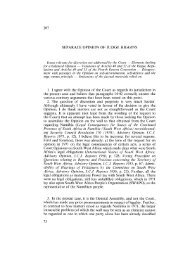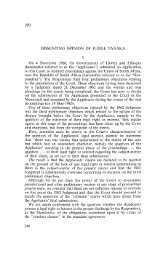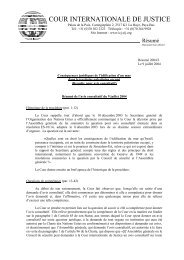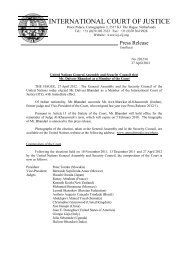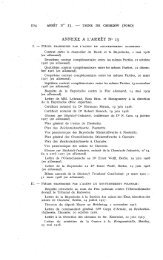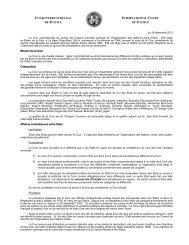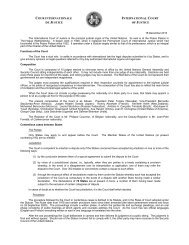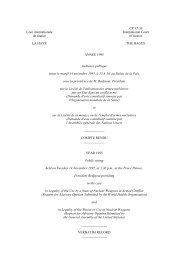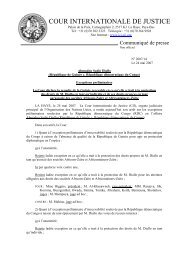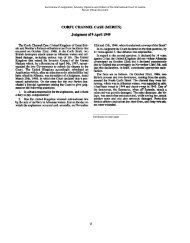C. Regional instruments in the context of the former Yugoslavia
C. Regional instruments in the context of the former Yugoslavia
C. Regional instruments in the context of the former Yugoslavia
You also want an ePaper? Increase the reach of your titles
YUMPU automatically turns print PDFs into web optimized ePapers that Google loves.
162 CONFERENCE ON YUGOSLAVIA (ARBITRATION COMM.)<br />
Recognition—States—Effects <strong>of</strong> recognition—Whe<strong>the</strong>r constitutive<br />
or declaratory — Conditions for recognition — Break up <strong>of</strong><br />
exist<strong>in</strong>g State — <strong>Yugoslavia</strong><br />
States — Criteria for statehood — Territory and population<br />
subject to an organized political authority — Federal State —<br />
Whe<strong>the</strong>r requirement that federal organs represent components<br />
<strong>of</strong> federation and wield effective power — <strong>Yugoslavia</strong> — Whe<strong>the</strong>r<br />
Socialist Federal Republic <strong>of</strong> <strong>Yugoslavia</strong> ceased to fulfil <strong>the</strong>se<br />
conditions by December 1991—Whe<strong>the</strong>r <strong>in</strong> process <strong>of</strong> dissolution<br />
State succession — Pr<strong>in</strong>ciples — Vienna Convention on State<br />
Succession <strong>in</strong> Respect <strong>of</strong> Treaties, 1978 — Vienna Convention on<br />
State Succession <strong>in</strong> Respect <strong>of</strong> State Property, Archives and<br />
Debts, 1983 — Whe<strong>the</strong>r reflect<strong>in</strong>g customary <strong>in</strong>ternational law<br />
— Outcome <strong>of</strong> succession to be achieved by negotiation on<br />
equitable basis — <strong>Yugoslavia</strong> — Whe<strong>the</strong>r Socialist Federal<br />
Republic <strong>of</strong> <strong>Yugoslavia</strong> <strong>in</strong> process <strong>of</strong> dissolution by December<br />
1991 — Declarations <strong>of</strong> <strong>in</strong>dependence by certa<strong>in</strong> Yugoslav<br />
Republics — Whe<strong>the</strong>r constitut<strong>in</strong>g secession — Whe<strong>the</strong>r any<br />
Republics or group <strong>of</strong> Republics cqnstitute cont<strong>in</strong>uation <strong>of</strong><br />
Socialist Federal Republic <strong>of</strong> <strong>Yugoslavia</strong> '<br />
OPINION NO. 1<br />
Conference on <strong>Yugoslavia</strong>, Arbitration Commission. 29 November 1991<br />
(Bad<strong>in</strong>ter, Chairman; Corasaniti, Herzog, Petry, and Tomas y<br />
Valiente, Members)<br />
SUMMARY: Thefacts:—Dur<strong>in</strong>g <strong>the</strong> summer <strong>of</strong> 1991, hostilities broke out <strong>in</strong><br />
<strong>the</strong> Socialist Federal Republic <strong>of</strong> <strong>Yugoslavia</strong> (<strong>the</strong> "SFRY") follow<strong>in</strong>g <strong>the</strong><br />
declaration <strong>of</strong> <strong>in</strong>dependence by some <strong>of</strong> <strong>the</strong> six Republics which constituted<br />
<strong>the</strong> SFRY. 1 In a Declaration issued on 27 August 1991, <strong>the</strong> European<br />
Community and its Member States, act<strong>in</strong>g with<strong>in</strong> <strong>the</strong> framework <strong>of</strong><br />
European Political Co-operation,- announced that <strong>the</strong>y were conven<strong>in</strong>g a<br />
peace conference ("<strong>the</strong> Conference on <strong>Yugoslavia</strong>") which would br<strong>in</strong>g<br />
toge<strong>the</strong>r <strong>the</strong> Federal Presidency and Federal Government <strong>of</strong> <strong>Yugoslavia</strong>, <strong>the</strong><br />
Presidents <strong>of</strong> <strong>the</strong> six Republics and representatives <strong>of</strong> <strong>the</strong> European<br />
Community and its Member States. The Declaration stated that an<br />
arbitration procedure would be established <strong>in</strong> <strong>the</strong> framework <strong>of</strong> <strong>the</strong><br />
Conference and provided that:<br />
The relevant authorities will submit <strong>the</strong>ir differences to an Arbitration<br />
Commission <strong>of</strong> fivemembers chosen from <strong>the</strong> Presidents <strong>of</strong> Constitutional<br />
1 The six Republics were Bosnia-Hercegov<strong>in</strong>a, Croatia, Macedonia, Montenegro, Serbia<br />
and Slovenia.<br />
t<br />
OPINION<br />
No. 1 163<br />
Courts exist<strong>in</strong>g <strong>in</strong> Community countries. The composition <strong>of</strong> <strong>the</strong><br />
Arbitration Commission will be:<br />
—two members appo<strong>in</strong>ted unanimously by <strong>the</strong> Federal Presidency;<br />
—three members appo<strong>in</strong>ted by <strong>the</strong> Community and its Member States.<br />
In <strong>the</strong> absence <strong>of</strong> agreement on <strong>the</strong> members to be appo<strong>in</strong>ted by <strong>the</strong><br />
Federal Presidency, <strong>the</strong>y will be designated by <strong>the</strong> three members<br />
appo<strong>in</strong>ted by <strong>the</strong> Community.<br />
This Arbitration Commission will give its decision with<strong>in</strong> two months. 2<br />
A second Declaration, issued on 3 September 1991, stated that:<br />
In <strong>the</strong> framework <strong>of</strong> <strong>the</strong> Conference, <strong>the</strong> Chairman will transmit to <strong>the</strong><br />
Arbitration Commission <strong>the</strong> issues submitted for arbitration, and <strong>the</strong><br />
results <strong>of</strong> <strong>the</strong> Commission's deliberations will be put back to <strong>the</strong><br />
Conference through <strong>the</strong> Chairman. The rules <strong>of</strong> procedure for <strong>the</strong><br />
arbitration will be established by <strong>the</strong> Arbitrators, after tak<strong>in</strong>g <strong>in</strong>to account<br />
exist<strong>in</strong>g organizations <strong>in</strong> <strong>the</strong> field. 3<br />
At <strong>the</strong> open<strong>in</strong>g <strong>of</strong> <strong>the</strong> Conference on 7 September 1991 <strong>the</strong> representatives<br />
<strong>of</strong> <strong>the</strong> six Republics accepted <strong>the</strong>se arrangements.'*<br />
On 20 November 1991 <strong>the</strong> Chairman <strong>of</strong> <strong>the</strong> Conference wrote to <strong>the</strong><br />
Chairman <strong>of</strong> <strong>the</strong> Arbitration Commission, request<strong>in</strong>g <strong>the</strong> Commission to<br />
consider whe<strong>the</strong>r those Republics which had declared <strong>the</strong>mselves <strong>in</strong>dependent<br />
(or which had <strong>in</strong>dicated that <strong>the</strong>y would do so) had seceded from <strong>the</strong> SFRY or<br />
whe<strong>the</strong>r <strong>the</strong> SFRY had dis<strong>in</strong>tegrated, so that all six Republics were to be<br />
considered equal successors to <strong>the</strong> SFRY, without any <strong>of</strong> <strong>the</strong>m, or any group <strong>of</strong><br />
<strong>the</strong>m, be<strong>in</strong>g able to claim to be <strong>the</strong> cont<strong>in</strong>uation <strong>of</strong> <strong>the</strong> SFRY.<br />
Held:—The SFRY was <strong>in</strong> <strong>the</strong> process <strong>of</strong> dissolution and it was <strong>in</strong>cumbent on<br />
<strong>the</strong> six Republics to settle such problems <strong>of</strong> State succession as may arise<br />
from this process <strong>in</strong> keep<strong>in</strong>g with <strong>the</strong> pr<strong>in</strong>ciples and rules <strong>of</strong> <strong>in</strong>ternational<br />
law, with particular regard for human rights and <strong>the</strong> rights <strong>of</strong> peoples and<br />
m<strong>in</strong>orities. It was up to those Republics which so wished to work toge<strong>the</strong>r to<br />
form a new association endowed with <strong>the</strong> democratic <strong>in</strong>stitutions <strong>of</strong> <strong>the</strong>ir<br />
choice.<br />
(1) The Commission's answer to <strong>the</strong> question put had to be based upon<br />
<strong>the</strong> .pr<strong>in</strong>ciples <strong>of</strong> public <strong>in</strong>ternational law which denned <strong>the</strong> conditions on<br />
which an entity constituted a State. The existence or disappearance <strong>of</strong> a State<br />
was a question <strong>of</strong> fact; <strong>the</strong> effects <strong>of</strong> recognition by o<strong>the</strong>r States were purely<br />
(2) A State was a community which consisted <strong>of</strong> a territory and a<br />
population subject to an organized political authority and was characterized<br />
1<br />
Declaration on <strong>Yugoslavia</strong> itsued by European Political Co-operation Procedure<br />
Extraord<strong>in</strong>ary M<strong>in</strong>isterial Meet<strong>in</strong>g <strong>in</strong> Brussels on 27 August 1991. The full text will be<br />
reproduced <strong>in</strong> D. Bethlehem and M. Weller, The Yugoslav Crisis, (to be published by Grotius<br />
Publications <strong>in</strong> <strong>the</strong> Cambridge International Documents Series).<br />
1<br />
Declaration on <strong>Yugoslavia</strong> issued by European Political Co-operation Procedure<br />
Extraord<strong>in</strong>ary M<strong>in</strong>isterial Meet<strong>in</strong>g <strong>in</strong> The Hague on 3 September 1991. The full text will be<br />
published <strong>in</strong> D. Bethlehem and M. Weller, op. cit. n. 2 above.<br />
* For discussion <strong>of</strong> <strong>the</strong> status and competence <strong>of</strong> <strong>the</strong> Arbitration Commission, see Inttrlocutoiy<br />
Decision (Op<strong>in</strong>ions 8, 9 and 10) at p. 194 el seq.



